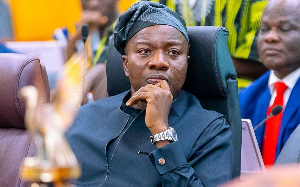The Speaker of Parliament, Rt, Hon, Michael Ocquaye, on Wednesday descended heavily on journalists who cover press conferences while Parliament is in session.
Prof. Mike Ocquaye issued the directive and threatened to punish journalists who go contrary to his ‘rather strange’ order.
The Speaker said it was wrong for journalists who had been accredited to report on plenary sessions to ‘abandon’ the house to conduct interviews, and went ahead to issue a fiat that any journalist who disregard his order, will be duly withdrawn from reporting from Parliament.
Some members of the Parliamentary Press Corps and Ghanaians have, however, frowned upon the directive. Parliament was chastised, especially on social media, that it had no power to stop or punish journalists who cover such press conferences outside the Chamber.
According to opinions gathered by this paper, if the Speaker wants to flex his muscles, then it should rather be against those Members of Parliament who decide to hold press conferences while the house is in session.
Journalists are by nature nosing for news, so if members of Parliament will desert the debate on the floor to hold press conference, why blame the poor journalist who is only chasing news.
The Chronicle is rather surprised that the Minority Leader, Haruna Iddrisu, and Majority Leader, Osei Kyei Mensa-Bonsu, have offered support to the Speaker’s directive.
The latter said the caution was not a threat but friendly advice, and that the Speaker did not intend to infringe on the rights of journalists, as misconstrued from his statement to the Parliamentary Press Corps.
In a rather ironical situation, the Member of Parliament for Ningo Prampram, Sam George, stated:
“Journalists are sometimes asked to leave the Chamber and cover meetings between the Speaker and other dignitaries while parliamentary proceedings are ongoing”.
There have been several occasions when the Minority Leader, Haruna Iddrisu, has led his caucus to hold media briefings while the house was in session.
We can also vouch that during the time when Osei Kyei Mensa-Bonsu was Minority Leader there were countless times when he led the minority group to hold press conferences when Parliament was still sitting.
What has now changed? What has changed is that the Minority is now the Majority and vice versa. What has not changed is that the media is doing exactly what it has been doing.
The Chronicle is indeed surprised about this u-turn by politicians and will want to unequivocally state that the media is not anybody’s play toy.
We cannot, but agree with the Executive Director of Media Foundation for West Africa (MFWA), Sulemana Braimah, that telling journalists which activities they must cover amounts to censorship.
Another seasoned journalist, Manasseh Azuri Awuni, also succinctly stated: “The parliamentary correspondent is answerable to his or her editor, and not the speaker. If the journalists cause a nuisance in the chamber or publish falsehood about Parliament, the Speaker may call them to order, and if they fail to reform, Parliament may revoke their accreditation. But once they’re not doing anything wrong, they should be allowed to do their job.’’
In this democratic dispensation, we must all play our roles and take our responsibilities, such that no one exceeds his or her powers.
Editorial News of Saturday, 29 February 2020
Source: The Chronicle













